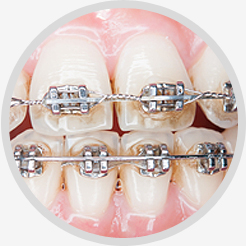
These orthodontic emergencies are very rare. In the case of orthodontic treatment, brackets often detach and come off, wires protrude or poke into soft tissues, or sometimes complicated orthodontic devices break apart or become disassembled. All of these occurrences can cause mild to severe discomfort and often anxiety. Sometimes the soft tissue can become infected, but this is rarely an emergency. Fortunately there are few true orthodontic emergencies. Situations such as a wire embedded in the cheek or broken appliance not allowing closure or opening of the mouth should be addressed as soon as possible.
After orthodontic bands are placed in the mouth, it is fairly common for teeth to [become or , as the periodontal ligament around the fault adjusts to the pressure from the orthodontic bands.] The discomfort is not an orthodontic dental emergency, and any discomfort is transient, and if necessary, over-the-counter pain medication may be taken.
Loose bands, wires that have become bent, or debonded appliance may cause mild to sometimes severe soft tissue irritation leading to infection. Orthodontic wax can be used on the source of irritation temporarily until the patient can see their orthodontist.
If an infection becomes significant where there is life-threatening swelling involving the airway, it is an orthodontic emergency and immediate dental and medical care is required. In this case, the offending appliance may have to be removed and antibiotics used. Life-threatening orthodontic emergencies should be addressed immediately as untreated without regard or concern to affecting, the orthodontic treatment as the patient`s life is of primary concern.